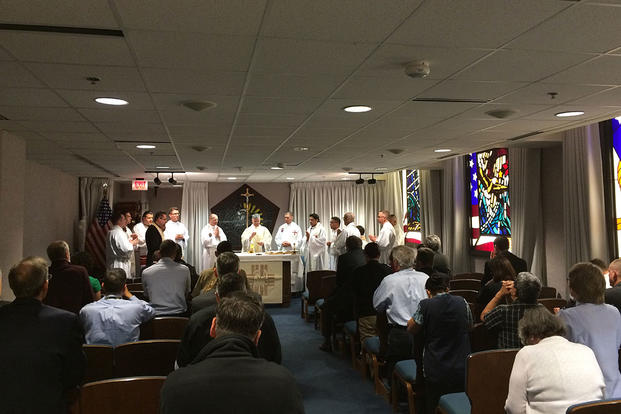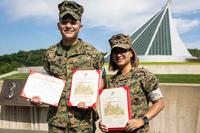Ten Roman Catholic priests from across the country, among them immigrants from South America, Europe and India, toured the Pentagon and took part in a Mass on Thursday as part of a weeklong retreat aimed at gauging their interest in becoming military chaplains.
The Pentagon visit followed several days of visits to other Washington, D.C., area military installations: Andrews Air Force Base in Maryland and Fort Belvoir and Marine Corps Base Quantico in Virginia. They met with chaplains, learned about what they do, and also with service members to hear what having a chaplain means to them.
"It's an edifying experience for a priest to see not only the need for military chaplains but the [determination] of priests to meet the need," a visiting priest from Wisconsin said. He believes he would find great satisfaction in being a chaplain: "I love God and I love my country," he said.
The "For God and Country" retreat was the second sponsored by the Archdiocese of the Military Services. The first, held last October, resulted in five of the 10 visiting priests committing to becoming military chaplains. A third retreat is planned for this October.
The archdiocese, which is the endorsing agency for Catholic chaplains, is eager to up the numbers of priests serving in the military. Though Catholics account for roughly one quarter of all U.S. service members worldwide, there are slightly more than 200 Catholic chaplains.
This is a problem for the Catholic Church, which expects its priests to see to the needs of its own faithful even while they work to support, comfort and ensure the spiritual needs of non-Catholics are met.
A Defense Department Inspector General report last year said that Catholic chaplains -- like those from low-density faith groups -- found the demands of meeting the needs of their units and performing services for their own faith group at large made for a difficult workload. This, even though Catholicism is not considered low density, the IG said. But priests "are in short supply and their presence is required to perform certain sacraments of the Catholic faith," the IG said.
Deacon Mike Yakir, chancellor for the Archdiocese of the Military Services, said there are some sacraments that only a priest can provide.
"If you're a Marine … going out on a patrol the next morning, and you think you might not come back and you want make confession, only a priest can do that," Yakir said. No other church official and no chaplain of another faith can offer a Catholic that sacrament.
But the archdiocese is also concerned with the possibility that Catholic troops who are not served by a priest will be drawn to another faith.
In an address to the General Assembly of the U.S. Conference of Catholic Bishops in Baltimore last fall, Archbishop for the Military Services Timothy Broglio said the need for more Catholic military chaplains had become "desperate."
"Approximately one fourth of the active-duty personnel and their immediate families are Catholics," he said. "At present, those Catholics -- totally, around a million people -- are served by only 217 priests in a territory that covers the globe. They represent only 8 percent of all military chaplains."
"That suggests that others might easily cultivate Catholic young people seeking spiritual counsel," Broglio said.
Though Broglio did not say who Catholics may drift to, his predecessor at the Archdiocese of the Military Services did criticize what he saw as aggressive proselytizing by evangelical Christians, according to "For God or Country? Religious Tensions Within the United States Military," a 2006 thesis written by Army Lt. Col. Jason G. Riley.
"That [proselytizing] is not accommodating the needs of others. Some people don't believe that, and it's not my position as a chaplain to require that of them," Archbishop Edwin O'Brien is quoted as saying. "I must respect who they are and what they are. Some evangelicals have stepped over that line."
Broglio, in his remarks in Baltimore, urged the bishops to release more priests to serve on active duty in the military, telling them it is "imperative that every diocese have at least one priest to ensure that your faithful who defend our religious freedom do not have to sacrifice theirs."
If the comments of three priests interviewed by Military.com on Thursday are an indication of how the latest retreat will go, Broglio should be pleased.
The three, interviewed after the entire group participated in a Mass at the 9/11 Memorial Chapel at the Pentagon, all said they are serious about becoming chaplains. Because few beyond their own bishops -- who authorized their participation in the retreat -- are aware of their interest in being chaplains, the priests asked that they not be identified by name or even parish.
"I felt here in the Army are people craving for God," said one member of the group, who now serves a parish in North Dakota. "In the parish, you go to the people, here they come to you. … If they grant me permission, I'm in."
A priest now with a parish in Tennessee, but originally from Eastern Europe, said he first considered the chaplaincy in 2009. At one time, he spoke with the Air Force but did not follow through.
He said being a military chaplain has the same attraction to him as being a priest in the United States -- the diversity of the parishioners.
"After spending a week [on the retreat], I … decided to join the Army Reserve," he said. That way he can serve the military but would also continue to serve his parish. "If my bishop approves, then I can begin the process," he said. "It will also be an adventure. You can look at it that way, too."
-- Bryant Jordan can be reached at Bryant.jordan@military.com. Follow him on Twitter at @BryantJordan.























